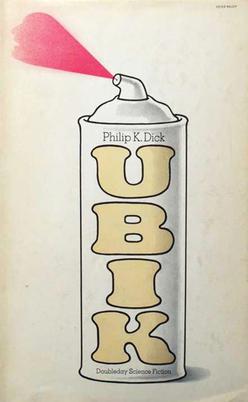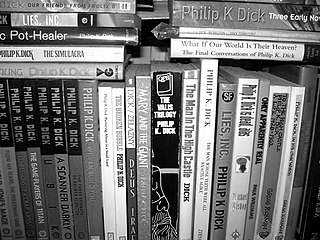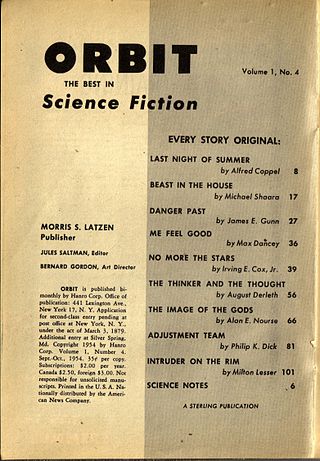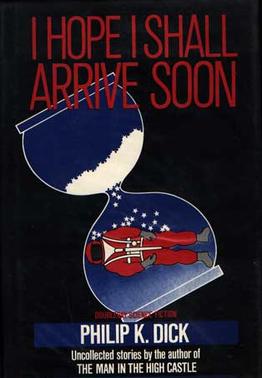
Philip Kindred Dick, often referred to by his initials PKD, was an American science fiction writer. He wrote 44 novels and about 121 short stories, most of which appeared in science fiction magazines during his lifetime. His fiction explored varied philosophical and social questions such as the nature of reality, perception, human nature, and identity, and commonly featured characters struggling against elements such as alternate realities, illusory environments, monopolistic corporations, drug abuse, authoritarian governments, and altered states of consciousness. He is considered one of the most important figures in 20th century science fiction.

Ubik is a 1969 science fiction novel by American writer Philip K. Dick. The story is set in a future 1992 where psychic powers are utilized in corporate espionage, while cryonic technology allows recently deceased people to be maintained in a lengthy state of hibernation. It follows Joe Chip, a technician at a psychic agency who begins to experience strange alterations in reality that can be temporarily reversed by a mysterious store-bought substance called Ubik. This work expands upon characters and concepts previously introduced in the vignette "What the Dead Men Say".

The Time Ships is a 1995 hard science fiction novel by Stephen Baxter. A canonical sequel to the 1895 novella The Time Machine by H. G. Wells, it was officially authorized by the Wells estate to mark the centenary of the original's publication. The Time Ships won critical acclaim. It won the John W. Campbell Memorial Award and the Philip K. Dick Award in 1996, as well as the British Science Fiction Association Award in 1995. It was also nominated for the Hugo, Clarke and Locus Awards in 1996.
The Owl in Daylight is a novel Philip K. Dick was writing at the time of his death in 1982. He had already been paid an advance for the book by the publisher and was working against a deadline. After his death, his estate approached other writers about the possibility of someone completing the novel based on his notes, but that proved to be impossible, as he had never formally outlined the story. Dick viewed the novel as his Finnegans Wake. The idea was inspired partly by an entry in the Encyclopædia Britannica on Beethoven that referred to him as the most creative genius of all time, partly by traditional views of what constitutes the human heaven, and finally by the Faust story.
"The Exit Door Leads In" is a science fiction short story by American writer Philip K. Dick. First published in 1979.
"Roog" is a science fiction short story by American writer Philip K. Dick. It was his first sold work, although not his first published story.
"Rautavaara's Case" is a science fiction short story by American writer Philip K. Dick. It was first published in 1980 in Omni magazine and subsequently in the 1985 short story collection I Hope I Shall Arrive Soon. The story was also included on We Can Remember It For You Wholesale, volume five of the Collected Short Stories of Philip K. Dick in 2003.

The Concept of Anxiety: A Simple Psychologically Orienting Deliberation on the Dogmatic Issue of Hereditary Sin is a philosophical work written by Danish philosopher Søren Kierkegaard in 1844.

The bibliography of Philip K. Dick includes 44 novels, 121 short stories, and 14 short story collections published by American science fiction author Philip K. Dick during his lifetime.

"Adjustment Team" is a science fiction short story by American writer Philip K. Dick. It was first published in Orbit Science Fiction with illustration by Faragasso. It was later reprinted in The Sands of Mars and Other Stories (Australian) in 1958, The Book of Philip K. Dick in 1973, The Turning Wheel and Other Stories in 1977, The Collected Stories of Philip K. Dick in 1987 (Underwood–Miller), 1988, 1990, Selected Stories of Philip K. Dick in 2002 and in The Early Work of Philip K. Dick, Volume One: The Variable Man & Other Stories in 2009.
"Novelty Act" is a short story by Philip K. Dick. It involves a dystopian future in which the characters' lives are based on entertaining the First Lady of the United States with "novelty acts." Many of the ideas developed in the story were reworked and reused for his later novel The Simulacra.

Robots, Androids, and Mechanical Oddities: The Science Fiction of Philip K. Dick is a collection of science fiction stories by American writer Philip K. Dick. It was first published by the Southern Illinois University Press in 1984 and was edited by Patricia S. Warrick and Martin H. Greenberg. The stories had originally appeared in the magazines Fantasy and Science Fiction, Galaxy Science Fiction, Space Science Fiction, Astounding, Future, Orbit, Science Fiction Stories, Imagination, Amazing Stories, Rolling Stone College Papers and Playboy.

I Hope I Shall Arrive Soon is a book by American writer Philip K. Dick, a collection of 10 science fiction short stories and one essay. It was first published by Doubleday in 1985 and was edited by Mark Hurst and Paul Williams. Many of the stories had originally appeared in the magazines Fantasy and Science Fiction, Worlds of Tomorrow, Amazing Stories, Interzone, Rolling Stone College Papers, The Yuba City High Times, Omni and Playboy.

The Collected Stories of Philip K. Dick is a collection of 118 science fiction stories by American writer Philip K. Dick. It was first published by Underwood-Miller in 1987 as a five volume set. See Philip K. Dick bibliography for information about the mass market reprints.

The Little Black Box is a collection of science fiction stories by American writer Philip K. Dick. It was first published by Gollancz in 1990 and reprints Volume V of The Collected Stories of Philip K. Dick. It had not previously been published as a stand-alone volume. Many of the stories had originally appeared in the magazines Worlds of Tomorrow, Galaxy Science Fiction, Amazing Stories, Fantasy and Science Fiction, Famous Science Fiction, Niekas, Rolling Stone College Papers, Interzone, Playboy, Omni and The Yuba City High Times.

The Eye of the Sibyl is a collection of science fiction stories by American writer Philip K. Dick. It was first published by Citadel Twilight in 1992 and reprints Volume V of The Collected Stories of Philip K. Dick, omitting the story "We Can Remember It for You Wholesale". Many of the stories had originally appeared in the magazines Worlds of Tomorrow, Galaxy Science Fiction, Amazing Stories, Fantasy and Science Fiction, Famous Science Fiction, Niekas, Rolling Stone College Papers, Interzone, Playboy, Omni and The Yuba City High Times.

Selected Stories of Philip K. Dick is a collection of science fiction stories by Philip K. Dick. It was first published by Random House in 2002. Many of the stories had originally appeared in the magazines Planet Stories, Fantasy and Science Fiction, Imagination, Space Science Fiction, Astounding, Beyond Fantasy Fiction, Orbit, Galaxy Science Fiction, Fantastic Universe, Amazing Stories, Rolling Stone College Papers, Omni and Playboy.
"Retreat Syndrome" is a 1965 short story by American writer Philip K. Dick. The story contains some common Dick themes such as a questionable reality and drug use. It was first published in Worlds of Tomorrow Science Fiction and was later reprinted the collections The Preserving Machine (1969), The Preserving Machine and Other Stories (1977), We Can Remember It For You Wholesale (2000) and The Eye of the Sibyl and Other Stories (2004).

"Mr. Spaceship" is a science fiction short story by American writer Philip K. Dick, first published in Imagination in January 1953, and later in The Collected Stories of Philip K. Dick. It has since been republished several times, including in Beyond Lies the Wub in 1988.
"The Great C" is a science fiction short story by American writer Philip K. Dick, first published in Cosmos Science Fiction and Fantasy Magazine in 1953. It has since been republished several times in collections such as Beyond Lies the Wub in 1988. Parts of the work, along with Planet for Transients, were later used in the full-length novel Deus Irae. The story is set in a post-apocalyptic world in which a young man is sent from his tribe every year to visit a godlike computer capable of mass destruction and try to stump it with three questions. The story was adapted into an animated virtual reality film in 2018 by Secret Location.












